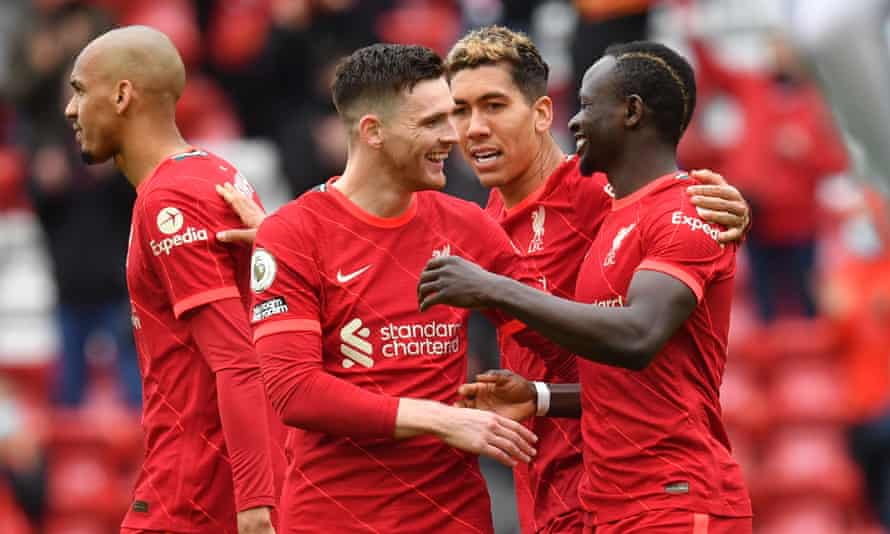Leicester give their all to the very end but the richest clubs prevail
As you were, then. At the end of this most unpredictable and turbulent of seasons, a time of pandemic and insurrection, the top four places in the Premier League ended in the hands of its four biggest and richest clubs.
Eight restless months after we started, English football’s new order – it turned out – looked largely like the old.
Liverpool’s season of angst, anxiety and crippling injury crises ended in a third-placed finish, a comfortable 2-0 win over Crystal Palace and bracing hugs all round. They may have shed 30 points from their title-winning season but what Jürgen Klopp’s side never mislaid was its unswerving belief in its own methods, its own principles, its own people. They were eighth in March, many of the club’s own supporters urging them to jack in the league and concentrate on winning the Champions League. Instead they ended with 32 points from a possible 36.
Behind them Thomas Tuchel’s Chelsea claimed the final Champions League place despite a late freakout at Villa Park, at one stage of which it looked as if their entire team was taking it in turns to foul Bertrand Traoré.
For most of the afternoon Chelsea were doing a passable impression of a side in the grip of implosion, in danger of slipping from third to fifth in the space of an afternoon. Ultimately they managed to find someone else to do their dirty work for them.
And so to the King Power Stadium, where Leicester’s dreams finally ran aground against a rampant, nihilistic Spurs.
Those who will inevitably point to their 4-2 defeat as evidence of another classic Brendan Rodgers late-season choke miss the point: this campaign has been far tougher than last, for numerous reasons. Virtually all of their first-team regulars have spent time on the treatment table this season.
Europa League football and a squeezed calendar have shrunk Rodgers’ training time. Even here their defender Wesley Fofana limped off after 20 minutes. Cursed, crippled and doubtless exhausted at the end of a 53-game season, they nonetheless managed to finish a point ahead of last season and win the FA Cup.
Still, if there was a prevailing theme to be drawn from the two hours of slaloming drama in Liverpool, Leicester and Birmingham, it was the invisible but inexorable power of self-image.

How else to explain Kasper Schmeichel’s injudicious decision to come for a cross with 15 minutes remaining and end up punching the ball into his own net?
Until that moment Leicester were still in the driving seat, 2-1 up against a poor Spurs side spearheaded by an unsmiling star striker who wants to leave and led by a manager who looks as if he has walked straight out of an advert for cryptocurrency. From that moment the day began to slip away from them. And as with Jamie Vardy’s poor cross that allowed Gareth Bale to break away for Tottenham’s third goal, Schmeichel’s brain-fade underlined one of the keys to securing the big prizes: an ability to make the right decisions when it matters.
Not that Chelsea were necessarily distinguishing themselves in this respect either. As Traoré put Aston Villa ahead and ostentatiously refused to celebrate against his former club (albeit one for whom he played a total of 10 league games in four years and whose fans probably had to remind themselves who he was), one could feel Chelsea’s composure melting away little by little. Mateo Kovacic, Jorginho and Timo Werner all flew into reckless challenges. Tuchel himself hardly gave off the air of a man in control of proceedings when he greeted the half-time whistle by legging it down the tunnel.
And in a sense these sorts of situations have always been the achilles heel of Tuchel teams, which are set up for rehearsed, immaculate control but often come unstuck in more fluid, chaotic games. It happened frequently in his final season at Borussia Dortmund, in Paris Saint-Germain’s games against Marseille and Monaco earlier this season, in the 5-2 defeat against West Brom last month. Here it was most evident in César Azpilicueta’s late red card for throwing an arm in the face of Jack Grealish: his first in seven years and a measure of how comprehensively Tuchel’s team lost the plot.
If Chelsea were fortunate here, then ultimately it was Leicester who were the real emotional fulcrum of the day: a team who for eight months had done a fine job of dressing and acting and talking like a Champions League team, only to find the cards stacked against them. Perhaps they will come back stronger next season. Or perhaps, in an age of cartels and financial polarisation, this was their best and last chance: a door that for all they heaved and shoved at it, was never truly open to them.
Subscribe To Our Newsletter
-
How to get a free jersey
- How to get Pcs free jerseys Feedback Customer Reviews About Us Contact Us News FAQ
-
User Center
- Forget Password My Orders Tracking Order My Account Register
-
Payment & Shipping
- Customs & Taxes Locations We Ship To Shipping Methods Payment Methods
-
Company Policies
- Return Policy Privacy Policy Terms of Use Infringement Policy

